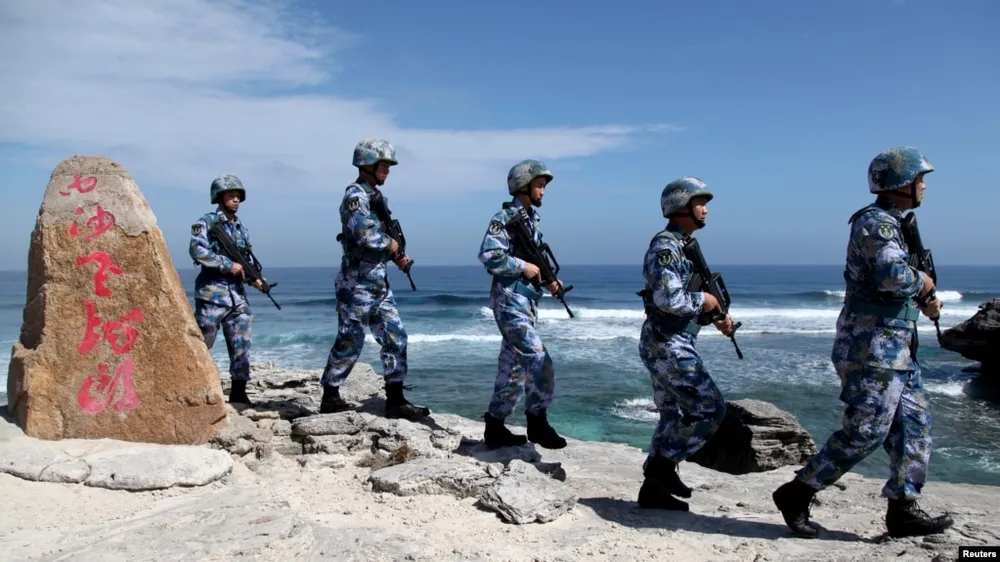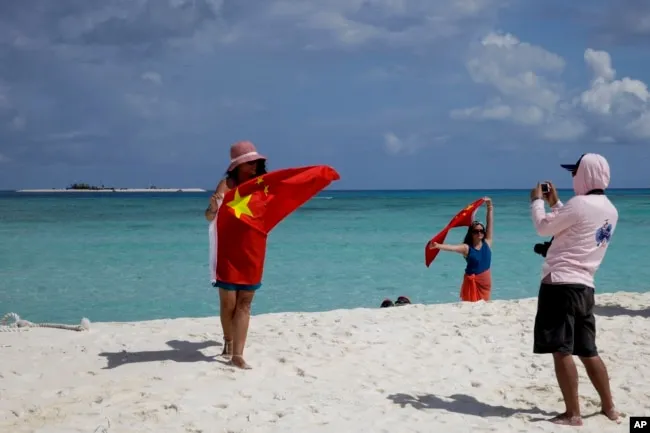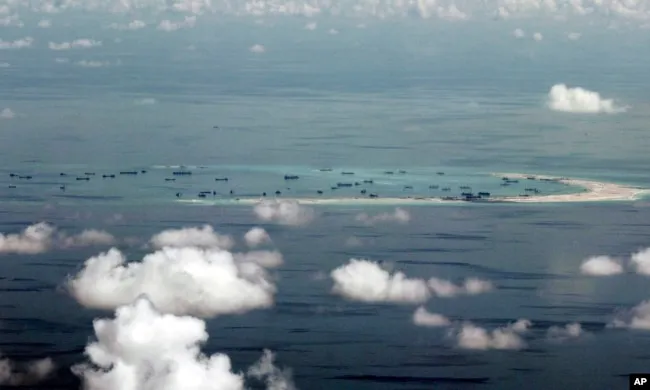
British journalist and scholar Bill Hayton said he found a document in the British national archives implying the Paracel Islands were a part of the “high seas,” and not under the control of Imperial China.
Le claimed this vindicated Vietnam’s longstanding claims over the archipelago.
“As reiterated on numerous occasions, Vietnam has full legal basis and historical evidence to assert its sovereignty towards the Paracel and Spratly islands in accordance with international law. The document discovered by scholar Bill Hayton affirms this,” Le said.
The Hayton find presents a new possible obstacle to China as the country continues to pursue sovereignty and exert maritime power in the South China Sea.
But while helpful to Vietnam’s case, the documents alone do not fully substantiate Vietnam’s own claims to the disputed islands.
On August 26, Hayton, the author of the books "The Invention of China” and “South China Sea,” announced the discovery of a new document, which was “in a box full of other great documents from 1899” in the UK National Archives.
“Finally found a South China Sea document I’ve been seeking for a long time! An 1899 translation of a letter in which the ‘Chinese Foreign Ministry’ (the Zongli Yamen of the Qing Great State) says the Paracel Islands are ‘high seas’ and, implicitly, not part of its territory,” he tweeted.
According to a report by Radio Free Asia (RFA), a sister news organization to the Voice of America, the letter concerns the so-called “Bellona copper case,” involving a German ship (the Bellona) whose copper cargo was stolen by Chinese fisherman after it shipwrecked in the Paracel Islands.
RFA reported that the Chinese government “refused compensation” for the British-insured copper, arguing the Bellona shipwrecked in “high seas” (not under the jurisdiction of any state), and therefore not in Chinese territory.
However, Hayton noted the letter he found was a translation, not the original.
Hayton also found a Chinese-language copy of another letter, dated April 14, 1898, from the viceroy or governor of Liangguang, the modern-day regions of Guangdong and Guangxi, sent to the British consul in Canton.
According to RFA, the governor likewise wrote that China could not be held liable for the incident since it occurred in “the deep blue sea.”
Regarding the document, Hatyon told RFA: “It’s not the smoking gun, yet. But it could be helpful for Vietnam to make the case that China really didn’t care about the [Paracel] islands until later.”

More recently, Beijing has cared a lot.
In a 1991 paper titled “China's Claim of Sovereignty over Spratly and Paracel Islands: A Historical and Legal Perspective,” Teh-Kuang Chang, a professor of political science at Ball State University in Indiana, summarized Beijing’s sovereignty argument:
“China discovered, and has exploited the islands in the South China sea for over two thousand years. Since the Chinese settled in these islands prior to any other people, China's claim of sovereignty over the islands in the South China Sea islands predates that of other nations,” Chang wrote.
Chang cited Chinese sources who claim that Chinese have inhabited the Paracel and Spratley islands from as early as the 7th century. According to those sources, this is evidenced by “ruins of living quarters, pottery and porcelain utensils, iron knives, iron cooking pots and other articles of daily use belonging to the Tang and Song dynasties.”
He further claimed that China has exercised jurisdiction over the Paracel and Spratly island groupings since the 9th century.
“In over a decade of looking into this issue I have never seen any convincing evidence that supports this assertion. We are presented with quotations taken out of context, maps that are copies of foreigners’ maps and objects recovered from non-Chinese shipwrecks and told they amount to concrete evidence. As soon as they are subjected to detailed independent examination they crumble like dust,” Hayton wrote.
Hayton pointed Polygraph.info to the work of maritime archaeologist Michael Flecker, who has overseen shipwreck excavations in Asia for more than three decades.
Like Hayton, Flecker argued that purported Han (206 BC to 220 AD) and Tang (618 to 906 AD) dynasty texts that China’s foreign ministry has used to establish maritime claims make no sense, since Chinese ships did not sail through the South China Sea then.
“Chinese texts dating prior to the 11th century cannot possibly demonstrate any form of claim or ownership, simply because the Chinese did not voyage through the South China Sea in their own ships until that time,” Flecker wrote.
He noted that other purported archaeological findings and historical records used to establish ownership of the island groupings are often questionable. For example, fragmentary evidence of Chinese ceramics on rock formations does not demonstrate habitation, how they got there, or who delivered them.
Even sifting through shipwrecks to determine historical claims is arguable.
Flecker maintained that, despite claims to the contrary, “the Paracels and Spratlys were effectively terra nullius (land belonging to no one) until the early 20th century.” The Spratly Islands, specifically, were viewed in centuries past as a dangerous place to “be avoided by navigators.”

That gels with Hayton’s analysis.
Hayton previously wrote that, despite Beijing’s claim to the contrary, there is no evidence Chinese state officials visited the Paracel Islands before June 6, 1909.
He likewise argued that in 1933, when attention was focused on the Spratly Islands, “the Republic of China decided not to press a claim to them.”
He contended that China during this period was not involved in “documenting a preexisting claim,” but rather “imagining and asserting one through the mobilization of both emotion and archival documents.”
Vietnam, meanwhile, claims to have effectively maintained a presence on the islands since at least the 17th century. Like China, it has put forward maps and other historical documents which it says show that the islands belong to Vietnam.
China has since worked to fortify the Spratly and Paracel islands militarily, part and parcel of broader attempts to control most of the South China Sea.




















